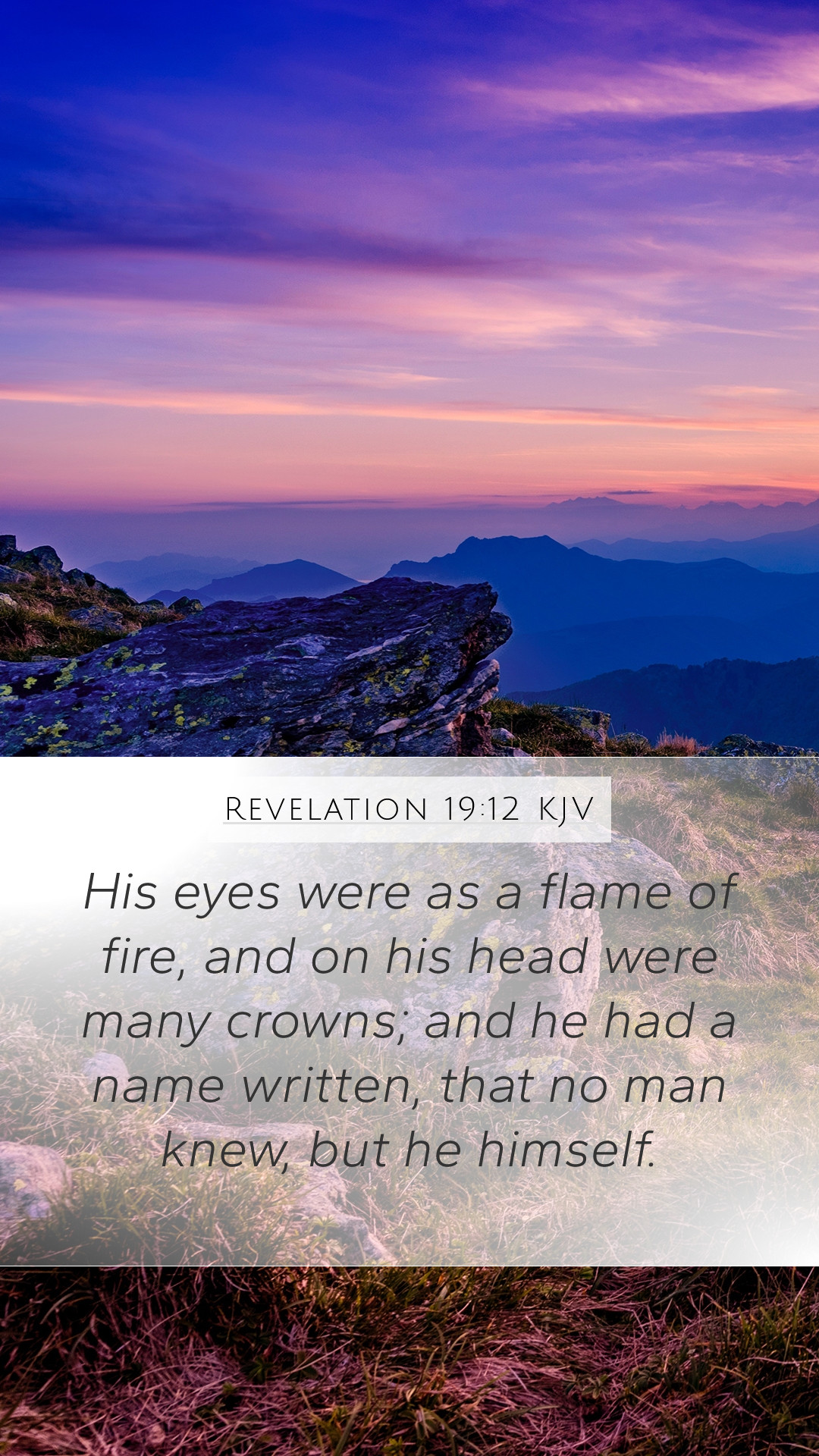Bible Verse Commentary: Revelation 19:12
Scripture Reference: Revelation 19:12 - "His eyes were like a flame of fire, and on His head were many crowns; and He had a name written that no one knew except Himself."
Meaning and Interpretation
This verse is a profound declaration of the majesty and sovereignty of Jesus Christ as described in the Book of Revelation. To understand this verse fully, we should analyze its components.
1. "His eyes were like a flame of fire"
The imagery of flames in Scripture often signifies purity, judgment, and divine insight. Matthew Henry suggests that the fiery eyes of Christ represent His omniscience—He sees all things fully and without deception. This also indicates the fervor with which He regards the affairs of humanity; nothing is hidden from His sight.
2. "Many crowns"
Many crowns symbolize ultimate authority over earthly and heavenly realms. Albert Barnes highlights the significance of numerous crowns as indicative of Christ's rightful rule over all nations and realms, rejecting earthly allegiances and proclaiming His celestial kingship. The crowns serve as a reminder that Christ has triumphed over all powers and dominions.
3. "A name written that no one knew except Himself"
The existence of a name known only to Christ speaks to His divine nature and mysteries. Adam Clarke interprets the hidden name as representative of Christ's unique authority and power, revealing aspects of His identity that are beyond human comprehension. This elusiveness draws believers into a deeper quest for intimacy with Christ.
Conclusion of Interpretation
In summary, Revelation 19:12 encapsulates a vision of Christ that is both awe-inspiring and intimidating. His omniscience, supreme authority, and the mystery of His being invite believers to a deeper relationship while urging recognition of His power and judgment.
Bible Verse Explanations
Understanding this verse involves recognizing the broader context of Revelation, which speaks extensively of Christ's return and the establishment of His eternal kingdom.
- Interplay of Judgment and Grace: Revelation depicts the tension between God's judgment against sin and His grace offered through Christ.
- Symbolism in Apocalyptic Literature: The Book of Revelation uses rich symbolism; thus, careful hermeneutics are required for meaningful interpretation.
- Theological Implications: This verse has profound implications for eschatology, highlighting the characteristics of the returning Christ and His ultimate victory.
Cross References
To gain further insights into Revelation 19:12, consider studying these related verses:
- Daniel 7:9-10 – A depiction of the Ancient of Days and His judgment.
- Revelation 1:14 – Describing Christ’s appearance with eyes like fire.
- Philippians 2:9-11 – God’s exaltation of Christ and the recognition of His authority by all creation.
Application of the Verse
This verse encourages believers to reflect on the nature of Christ as both a compassionate Savior and a righteous judge. Here are some practical applications of understanding this verse:
- Awareness of Christ's Authority: Acknowledge His sovereignty in every aspect of life.
- Call to Righteous Living: In light of His judgment, live up to the standards set forth in His Word.
- Encouragement to Seek Intimacy: Pursue a deeper relationship with Christ, knowing that He holds mysteries that can enrich faith.
Further Study Recommendations
For a deeper understanding of this verse and its implications, consider utilizing various Bible study resources:
- Online Bible study platforms for access to commentaries and discussion.
- Bible study groups for shared insights and reflections.
- Bible study guides that provide structured lessons on Revelation and its themes.
Conclusion
Revelation 19:12 offers rich insights into the identity of Christ and serves as a powerful reminder of His ultimate authority and the mystery of His nature. Engaging with this verse through personal study and discussion within a community can lead to greater understanding and application of biblical truths in today’s world.


